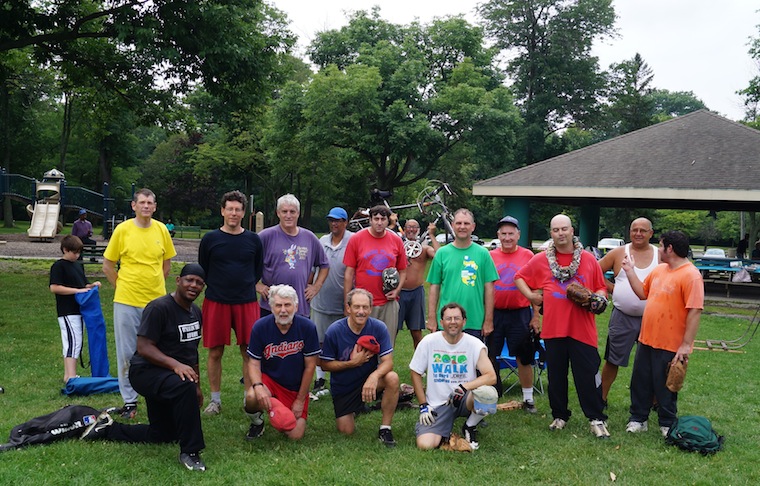This week, with the game on the line in the top of the last inning, the visiting team smartly aimed their offense at a weak spot in the infield and ended up with one single, one runner on base by error, and three successfully fielded ground balls. Outlier!
Then, needing a run to win with two outs in the bottom of the last inning, and bases loaded, this same fielder came up with his bust-to-boom hitting approach and pumped a pitch 300 feet for the walk-off win.
One run game. Ideal obtained!
A simple example will show the nature of this difficulty. Consider some ball game played by a few people of approximately equal skill. If we knew a few particular facts in addition to our general knowledge of the ability of the individual players, such as their state of attention, their perceptions and the state of their hearts, lungs, muscles etc. at each moment of the game, we could probably predict the outcome. Indeed, if we were familiar both with the game and the teams we should probably have a fairly shrewd idea on what the outcome will depend. But we shall of course not be able to ascertain those facts and in consequence the result of the game will be outside the range of the scientifically predictable, however well we may know what effects particular events would have on the result of the game. This does not mean that we can make no predictions at all about the course of such a game. If we know the rules of the different games we shall, in watching one, very soon know which game is being played and what kinds of actions we can expect and what kind not. But our capacity to predict will be confined to such general characteristics of the events to be expected and not include the capacity of predicting particular individual events. Friedrich August Von Hayek
As the Free Play Softball handicapper for ten years, social systems/human cybernetic theories provide me with critical perspectives, none of which impact my ability to obtain the ideal of handicapping: a close game. Such perspectives are meta-related (second order in a cybernetic sense,) to the game at-hand. They allow me to not only be a participant/observer, but also to be informal analyst/ethnographer. Crucially, at least for my peace of mind, I can step back and consider the interplay of domains in the game but not of the game. Another consequence of how I view my role is: I make out line-ups knowing beforehand that any line-up possesses characteristics of some kinds,and, doesn’t possess characteristics of other kinds.
For example, line-ups do not possess the characteristic of embedding the eventual outcome of the game within their flux of estimations and generalizations.
They do reflect an on-the-spot generalization of a quick reconnaissance of performative variables. However, I know going into the exercise that the actual dynamic interplay of many player’s regression-to-the-Mean with the outlying performances of a handful of players is enough to falsify any hope for a close game, and realization of a game that objectifies actual parity. I make a very informed effort to design a close game and yet close games, decided by three or fewer runs, are comparatively rare.
(I have had occasion to point out to a few of the several players who monitor my handicapping track record that outlying negative performance of the better players and exceptional performances of the mediocre players tends to be more decisive than the mean performance of mediocre players.)
Other players theorize the line-ups. Player’s folk theorizing doesn’t bother me because I understand the double framework of the performative system: the Meta-system is focused by its norms and heuristics–a line-up is a heuristic–while the phenomenal system instantiates the precarity of performance. The latter system cannot ratify idealized estimations. Idealized estimations are heuristic; what players actually do to implement the five skills (hit, catch, throw, run, remember where they bat in the lineup,) is part of the phenomenal–enacted by experience–system.
One of the most fascinating aspects of the Free Play Softball League for me, the inveterate researcher, is that I assume most players think meta-thoughts about the game and these in turn refer at least loosely to their cognition within their own contextualizing of their individual Free Play experience. I don’t know anybody else’s detailed specific system-making, but I do know how I contextualize the game. Players may regard the heuristics, regard their phenomenal experience of the game, and reflect upon and make connections between the two fields in completely different ways. There is something of the black box in this, but also, the line-up–which after all is a quasi-economic object too–is established to be the main totem of anticipation of outcome.
The line-up is a charismatic object, and along with this come, at times, a projection onto the handicapper which holds that in some direct way the result of the game is embedded by me (!) in the line-up. No, most times my estimations and generalizations, aimed to achieve parity, are falsified.
What allows me to put up with line-up related guff is my understanding something about the math of precarity in human systems.


